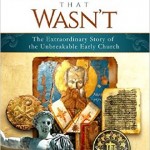 I associate dieting with Lent. Not because I equate fasting with dieting, but because of a double coincidence. Ten years ago I was extremely overweight, and my doctor put me on a strict diet. It was a couple of days before Ash Wednesday, and I came home and told Jane, “I’m giving up food for Lent.” It was one of the those jokes of the “funny/painful” variety.
I associate dieting with Lent. Not because I equate fasting with dieting, but because of a double coincidence. Ten years ago I was extremely overweight, and my doctor put me on a strict diet. It was a couple of days before Ash Wednesday, and I came home and told Jane, “I’m giving up food for Lent.” It was one of the those jokes of the “funny/painful” variety.
That diet was success; I lost lots of weight, and kept it off for quite a while; but a couple of weeks ago I went to do the doctor and was once again told that I had to lose quite a lot of weight; and this doctor told me to consider Weight Watchers. And so, once again, I prepared to “give up food for Lent,” and two weeks ago my wife and I joined WW.
I’d never done WW before, and had no real idea what to expect. I knew there’d be weigh-ins and calorie counting and like that, but beyond that nothing. At the meeting this morning, though, I began to see that there’s quite a lot more to it than just counting points, and inevitably began to think about Aristotle.
Really. I couldn’t help it.
The speaker today said that we have two appetites: the homeostatic appetite and the hedonic appetite. The former tells us when we need to eat so that we don’t die; the latter tells us that we’d like eating (or not eating) this food in front of us whether we need it or not. The trick, clearly, is to bring our hedonic appetite in line with our homeostatic appetite, so that the amount we enjoy eating is what we in fact need to live and maintain our weight.
And I thought, “He’s talking about virtue!”
When it comes to food, the virtue of temperance involves eating what we need (and enjoying it!): which is to say, bringing our hedonic appetite in line with our homeostatic appetite. Further, Aristotle would tell us, each virtue is a happy mean between two extremes: in this case, gluttony on the one hand, and anorexia on the other. And it’s clear that having a hedonic appetite much bigger or much smaller than it should be leads to just these two extremes.
It fascinates me that WW is teaching virtue, but it shouldn’t surprise me; natural virtue isn’t pie-in-the-sky morality, something for people with high ideals, but rather virtue is the rock-hard practical way of being happy in this life. If WW is to really help people change to a healthier lifestyle, it has to be based in reality, and that means virtue.
What fascinates me is that WW has quantified the homeostatic appetite as an aid for 21st Americans like me. We are so used to being well-fed that it is hard for us to know when we’ve eaten just what we need. But WW’s algorithms tell us. When I joined, I was given a daily points budget calibrated to my weight; and I was told that if I kept within my points budget I’d lose weight. I was skeptical; but it seems to be working.
In the meantime, I won’t tell you what I’m doing for Lent; but I can tell you that it doesn’t involve food in any way, shape, or form.












